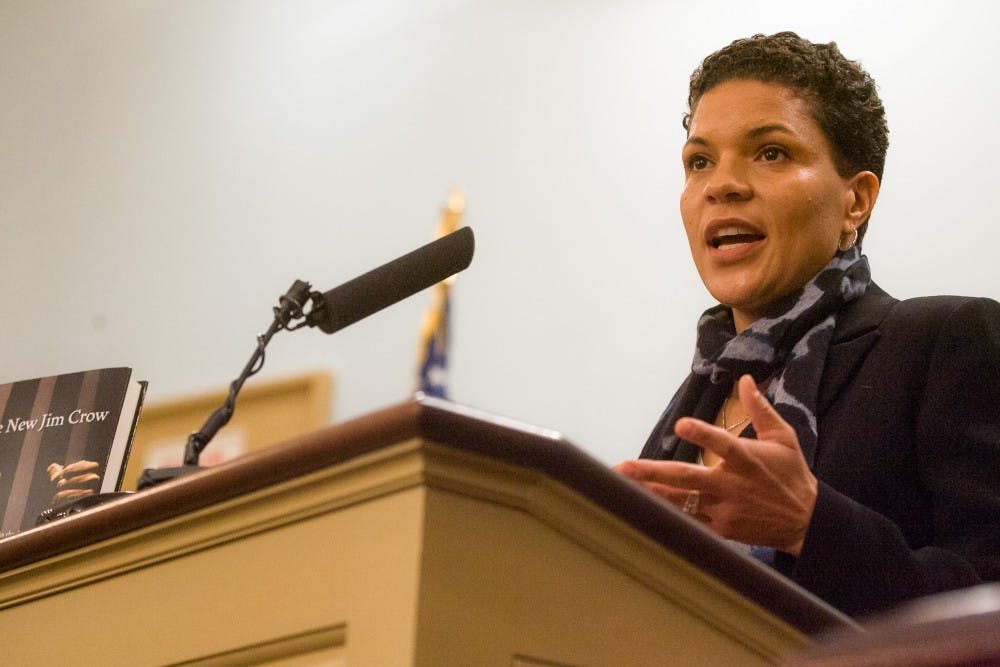Several hundred students, faculty and Charlottesville residents assembled in Old Cabell Hall to hear from Michelle Alexander, the New York Times best-selling author of “The New Jim Crow” Tuesday. The event was hosted by the School of Engineering and Applied Science as a part of the Excellence through Diversity Distinguished Learning Series.
The event quickly hit capacity in Old Cabell Hall — which holds a maximum of 851 people — and an additional 50 people watched a live-stream from Rouss Hall. Approximately 250 people waiting in line for the free event were unable to attend. The exceptionally large turnout prompted the Distinguished Learning Series administration to consider exploring larger venues for the next speaker, political activist Angela Davis, scheduled for March 27.
Before the event, Alexander spoke with The Cavalier Daily about one of the major themes of her book “The New Jim Crow” — that the racism and white supremacy that helped establish slavery in America, reemerged later as Jim Crow, segregation and now mass incarceration of African Americans. Alexander related the theme back to events in Charlottesville last summer when white nationalists marched on the Lawn and held the deadly Unite the Right rally Downtown on Aug 11 and 12, respectively.
“The events in Charlottesville most recently show that what many thought was past is present,” Alexander said. “If we are going to deal meaningfully and constructively with racial injustice and racial inequality today, we have to be willing to face very squarely our racial history and begin the process of truth telling and making amends in order for reconciliation to be possible.”
Alexander participated in an open conversation on stage with moderator Kerry Abrams, a University Law Professor and vice provost for Faculty Affairs. Throughout the event, Alexander touched on several issues, including mass deportation and mass incarceration.
“This is an excellent example of how … when you fail to challenge one human rights nightmare in its infancy, it inevitably gives birth to others,” Alexander said.
Alexander addressed another theme in her book — that throughout history, there have been racial and social controls that appear to die, but are simply hidden from the general eye. She made a point to explain that racism has never disappeared, but has instead transferred into our “selective subconscious.”
“Whether or not we return to that kind of America or whether we reimagine our democracy and push forward and evolve as a nation and as a people is the question that we face here in Charlottesville and as a nation as a whole,” Alexander said.
The conversation also featured Lt. Gov. Justin E. Fairfax (D), who spoke on the importance of individuals telling the truth in historical context.
“I think the role of universities … is to tell the truth,” Fairfax said. “Truth is a powerful weapon against misinformation but we have to make sure that we are doing it consistently and doing it in a way that is accessible to all.”
Thomas Pilnik, program coordinator of the Office of Diversity and Engagement, has worked with Dean Gates in enhancing the series from the previous year. This year’s series began last September with Harvard Professor Cornel West, who spoke after the events of Aug. 11 and 12. Pilnik said after West’s talk, the series had a new meaning.
“From that moment I think the tone was set,” Pilnik said. “Everyone that has followed has come here knowing that it is more meaningful than ever to stand on the fate of Charlottesville, Virginia to be disputed with the University of Virginia.”
Following the event, second-year Engineering student Nia Blibo said she learned a lot from Alexander’s book, her talk on understanding history and how to move forward in shedding light on current issues.
“I think my biggest takeaway from her book and from this talk in general is just [to keep] pushing the boundaries of what we are allowing to be told, what the narrative is about history in general and what our present day is going to look like,” Blibo said. “So that the people who have been disenfranchised and people who don’t have a voice have a voice, and so that in later generations we can get a complete picture of what today’s world and what our past looked like.”
The Excellence through Diversity Distinguished Learning Series was developed in 2016 by John Fitzgerald Gates, associate dean and chief diversity officer for the School of Engineering and Applied Sciences, who joined the University faculty in March of that year. After numerous students expressed the need for more diversity and inclusion, Gates decided to develop the series to allow students to hear from high-profile speakers on inclusion and excellence.
Gates said this series is not just for students to be engaged, but also individuals within the community to have the opportunity to listen to the speakers as well.
“We wanted to make sure that communities were represented and so we’ve had in mind the whole of U.Va. and charlottesville, but also communities that are often marginalized and disenfranchised,” Gates said.
The next and penultimate speaker in the series is political activist, scholar and writer Angela Davis, who is scheduled to speak March 27. The series will conclude with a visit from former NFL player and LGBTQ activist Michael Sam April 12.







